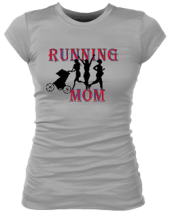Beginner Running Tips
Beginner running tips, what you need to know to start running.
 |
|---|
If you're a new runner, these running tips will help you get started on the right foot.
If you are an experienced runner but going through a bit of a slump, these beginner running tips will help you get through that slump and remind you why you fell in love with running to begin with.
1) Run for one mile. Stop and stretch. Then continue running.
After four years of running, I've finally found THE key to what makes all my runs more successful: the stop and stretch.
One of the first beginner running tips we're taught is to stretch stretch stretch after our run and many of us don't no matter how many times we're told this because it's just not as fun as running and "we don't have time."
We'll I've found the solution to this. I still try to stretch after most of my runs, but to be sure and stretch and to make all my runs even better, I run for ten minutes or one mile, whichever comes first, stop and get in a good stretch, and then keep on running.
And if I feel a cramp coming on during my run, I stop and stretch again. This has made me be able to run farther and finish stronger. For tips on specific running stretches, click here.
2) Find YOUR time of day to run.
Some people do better running in the morning while some do better running later in the day. It all depends on the individual, the kind of day you've had, the season you're running in and so much more.
What I've found is that I have better days when I run first thing. I don't have the pressure hanging over me all day of, "I need to run, when am I going to get in a run," and I feel more inspired throughout the day.
However morning runs themselves are not as good for me as evening runs. I'm slower, and it takes me longer to get into the run.
Evenings are the times I usually have my best runs. I run the fastest, especially when I've properly fueled and eaten plenty of healthy vegetables and carbs throughout the day.
So my beginner running tip for you is to find the time of day that feels right for you, and even if you can't always run at that time, try to get in a run at your perfect time of day at least once a week, so you have a better chance of getting in a really good run.
Or you can try the next thing on my list of beginner running tips.
3) Break up your run into two runs in one day.
If your screaming kid in the jogging stroller cuts your runs short, or if you don't have long to run, try what some of the pros do. Try breaking up your run into two shorter runs.
Another benefit of this, is you feel strong throughout your run and don't tire out as quickly.
For example, a perfect running day for me is to get in an easy 20 minute run in the morning to get my day started and then an interval run to practice my speed and endurance later in the day.
4) Add fartleks.
Fartleks is one of the runners favorite words. And no, it does not mean running as fast as you can during a race so you don't fart in anyone's face.
Fartlek is a sweedish word which means "speed play." Without bothering you with the more technical meaning of the word, it basically works like this.
You run at your normal speed, then pick a location such as a pole or a tree or a half mile marker up the road and increase your running intensity and speed until you get to that marker. Then slow back to your normal pace. Repeat this five or six times throughout your run.
This is a form of interval training, helps you burn more fat, makes you stronger and faster, and I think it makes the runs more interesting.
For more about Fartleks and other interval training, click here.
5) If you have to choose between one long run a week or three-four short runs, choose the more frequent short runs.
Being a weekend runner takes a toll and if practiced on a regular basis can cause injury.
My alternative to the long run is to do two-semi long runs two days in a row. For example, instead of doing a 14 mile run, do a 7 mile run two days in a row.
6) Pick a hill and run up and down it as many times as you can.
Try to maintain the same speed or even get faster every time you run up the hill. Use the downhill run to recover.
Here are some more beginner running tips on hill training.
7) Exaggerate your runs some days.
Pick your legs up higher, kick your feet back farther, swing your arms harder. Skip. This gives your regular running muscles a break and makes you stronger and faster overall.
8) Don't leave out cross-training and strength training.
It is important to take a break from running some days and do other workouts.
Cross training is a good way to get in a cardio workout without putting the pressure on your joints and feet that running does. Some good cross training workouts are biking, swimming, pilates and rebounding.
Strength training, especially squats and lunges, is also very important for runners because it helps workout quads, hamstrings and other muscles, so that you are stronger and don't risk getting knee pain and other running injuries.
Here are some beginner running tips on weight training for runners.
Continue to Beginner Running Tips Part Two









